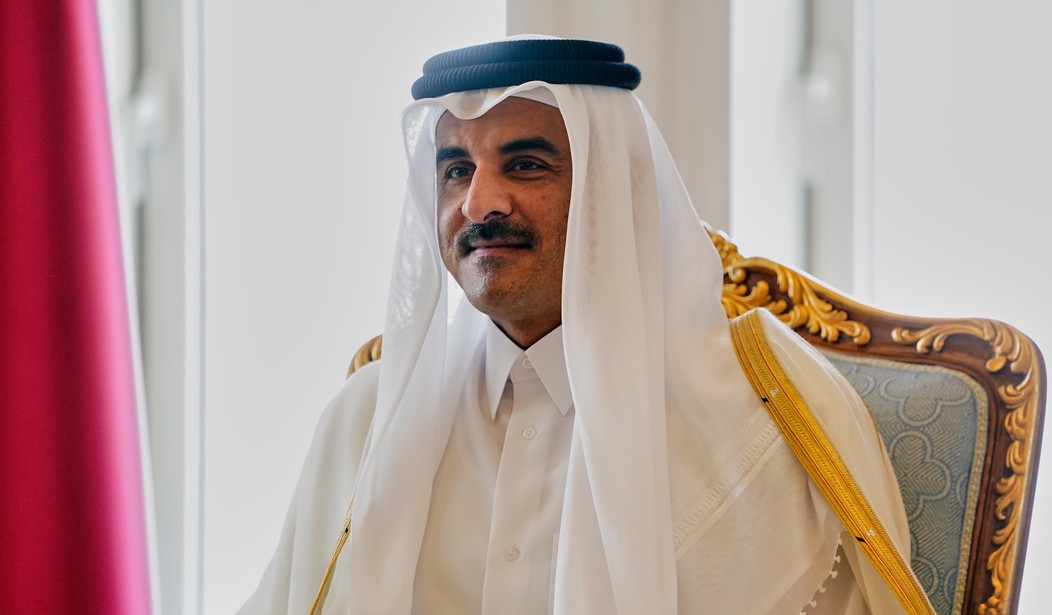Qatar still thinks money can buy you love, and it has spent hundreds of millions of dollars in the United States to prove it.
During the first Trump administration, Saudi Arabia, the United Arab Emirates, Bahrain, and Egypt severed ties with Qatar, citing a list of transgressions, including "Qatar's continued support, funding and hosting of terror groups" and efforts "to promote the ideologies of Daesh [ISIS] and Al Qaeda across its direct and indirect media." Trump sided with the Saudi-led bloc. Qatar, keen to win the administration's favor, began strengthening its lobbying muscle in the United States. In 2017, the year Qatar received the cold shoulder from its neighbors, Doha reportedly spent $16.3 million on lobbying — nearly quadruple the previous year's expenditure.
Documents submitted to the U.S. Justice Department, pursuant to the Foreign Agents Registration Act (FARA), indicate that when Trump was first in office, much of Qatar's lobbying focused on lifting its neighbors' blockade, attempting to change the associated narratives about Qatari support for extremism, and promoting Doha as a valuable U.S. ally.
The Gulf rift ended in January 2021, but Qatar's desire for a squeaky-clean image hasn't changed. Qatar maintains a sizable army of American lobbying, law, and public relations firms to advocate on its behalf with the government and in the media.
In 2017, Congress was considering legislation further to squeeze Hamas and Palestinian Islamic Jihad financing networks. The bill explicitly called out Qatar for providing "significant financial and military support" to Hamas. Doha quickly mobilized to sway lawmakers against the bill (H.R. 2712). Disclosures submitted to the U.S. Department of Justice indicate that registered agents of Qatar distributed materials warning that H.R. 2712 "erroneously and unfairly targets Qatar" and that if the bill "were to become law" and "the Administration was pressured into implementing sanctions," a $6.2 billion Boeing contract and thousands of American jobs would "be jeopardized." The bill did not pass.
The lobbying in Washington continued even after the blockade ended. The 2022 FIFA World Cup — which the tiny Persian Gulf nation was hosting — was fast approaching, and Doha had come under scrutiny in the runup to the tournament for its treatment of migrant workers. Registered agents of Qatar distributed materials in the United States promoting Qatari "labor reforms" and boasting that Qatar had "done more than any other country in the region to strengthen the rights of migrant workers and improve their living and working conditions."
Recommended
The accusations have continued, including in a U.S. State Department report on human rights in Qatar.
Ten months after the World Cup wrapped, Hamas launched its October 7, 2023, assault on Israel that killed 1,200, thrusting Qatar — home to much of Hamas's senior political leadership — back into the global spotlight. Since October 7, Qatar has dispatched lobbyists to liaise with congressional offices about Gaza and to showcase its value as a mediator.
One law firm on Qatar's payroll, for example, sent more than 150 emails to congressional offices between October 19 and October 24, 2023, about "Qatar's role in the release of Gaza hostages." That same week, Qatar's ambassador to Washington published an article in The Wall Street Journal arguing that "Qatar's policy of engaging with all sides can yield positive results."
Foreign influence on higher education has also come into focus since October 7. As a major foreign funder of American colleges and universities — not to mention one that keeps Islamist company — Qatar has received significant attention. Doha hired former U.S. Secretary of Education Bill Bennett to "publicize the fact that Qatari higher education efforts do not support radical Islamicist [sic] movements or positions."
Similarly, in advance of the June and July 2025 congressional hearings on campus antisemitism, former Congressman Jim Moran's lobbying firm logged engagements with multiple Capitol Hill offices regarding "allegations regarding Qatar's influence on college campuses."
Georgetown University Interim President Robert M. Groves testified at the July hearing, during which Rep. Mark Harris (R-NC) asked Groves why Georgetown "awarded a medal" to the mother of Qatar's emir, Sheikha Moza bint Nasser, who "had posted on social media comments praising the October 7 attack on Israel." Responding to Harris's line of questioning, Groves replied: "The deepest commitments of Georgetown stem from our Jesuit heritage of educating youth around the world. And she — she's a great example of that, through her work over the decades." Groves said that Georgetown, which soaked up nearly $1 billion from Qatar over the last two decades, "will not revoke the medal."
In total, FARA disclosures indicate that Qatar has spent $225 million — and counting — to court American officials and media. This activity is all legal and publicly disclosed. But lawmakers, journalists, and the everyday Americans they reach must assess whether what Qatar wants is in America's best interest.
Natalie Ecanow is a senior research analyst at the Foundation for Defense of Democracies (FDD). Follow Natalie on X @NatalieEcanow and FDD @FDD.

























Join the conversation as a VIP Member